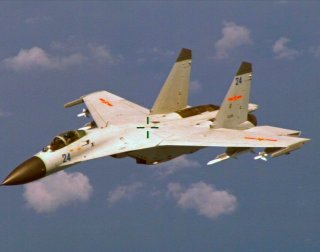War With China? Possible, But Not for Reasons You Think
Avoiding war requires a delicate balancing act.
Both China and Russia are eager to assert their own authoritarian models of national “greatness.” Related to this goal is knocking down the international order forged by the United States and its allies after World War II, an open, rules-based international system that brought prosperity to so many nations (including China once Beijing embraced it).
But national greatness, whether political influence, soft power, or military might, is largely a function of economic power. By participating in (and in many cases gaming) the open, capitalist trade and economic system, China has built economic power. China and the world are now economically interdependent. Many depend on China’s exports, and global companies want to keep access to the Chinese market.
Meanwhile, Russia has lost it. With a GDP the size of Italy and the hemorrhaging of its best and brightest after the invasion of Ukraine, Russia’s economy is a literal Potemkin village. Once weaned of dependence on Russia’s oil and gas, nobody needs Russia’s economy. The only way for Russia to assert influence in the world and to maintain the fiction of “greatness”—is by destructive military actions.
Now, China risks losing its true source of power and influence—its robust, entrepreneurial, globally entangled economy. President Xi Jinping is reining in entrepreneurs and free speech, frightening away foreign businesses, investors, and Chinese entrepreneurs. China is losing business abroad as many countries and companies work to decouple from China’s corrupting, surveilling, and stealing state-run economic apparatus. China’s birth rate is dropping, growth is slowing, and political leadership is congealing around a “strongman” more focused on control at home and saber-rattling abroad than economic prosperity.
Most observers predicted that China’s rise would eclipse America’s economic and political influence in the world. That’s the story of American decline and China’s rise promoted by Xi Jinping. Conventional wisdom also sees this dynamic as the most likely source of a military clash between China and the United States. An “empire” in decline threatened by a rising power leads to conflict.
But this doesn’t describe the current reality. The United States and its allies are working hard. So far, they are keeping the economic high ground by making disruptive innovations like the fastest chips and artificial intelligence that drive new businesses and maintain national security. Russia’s innovation economy is gone, and China is chasing its own away, exposing the fragility of a system propped up by state spending, and political versus market direction.
However, this is not all good news. As we have seen, an increasingly isolated and diminished power like Russia chooses to lash out militarily. A China beginning to lose the underpinnings of its new-found international influence could prove even more dangerous—and more eager to assert its “greatness” through military adventures and political and economic coercion.
Avoiding war requires a delicate balancing act. We in the United States must acknowledge the aspirational and identity-based yearnings of the Chinese people: namely, the desire to be recognized as a great nation and to rise economically.
We need to say to China: we welcome your rise as a great nation, a great culture and people. We have no desire to keep you “down.” But we don’t welcome political and economic coercion of other nations and peoples, acts of military force. We will, working with allies (that we still have), check and contain these efforts at every turn.
John Austin is a Nonresident Senior Fellow with the Brookings Institution and the Chicago Council on Global Affairs.
Image: U.S. Department of Defense.

